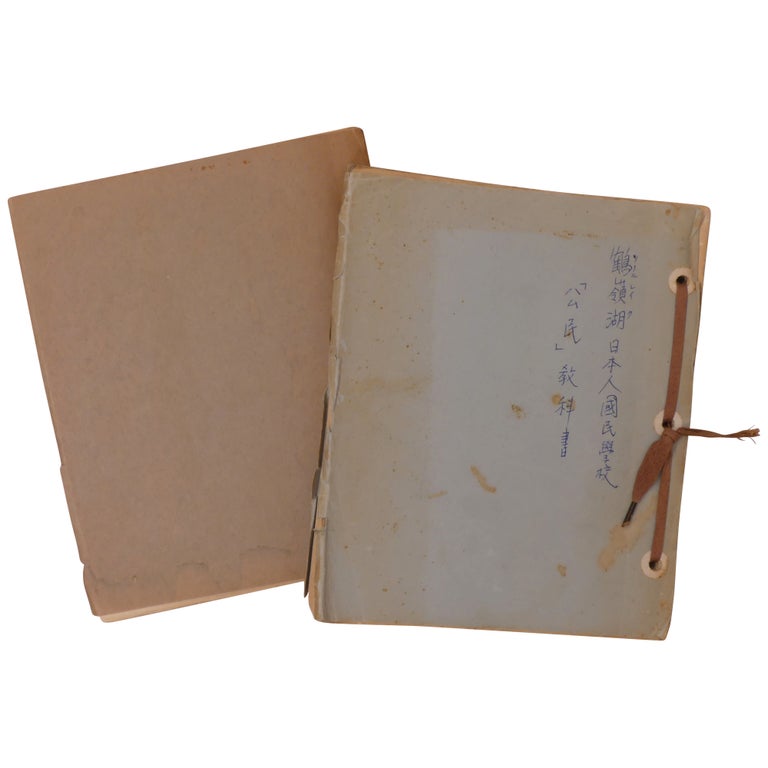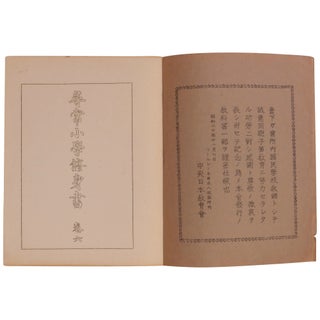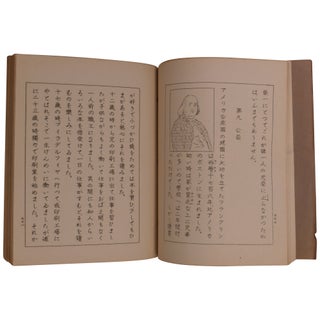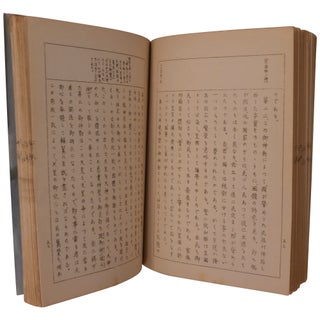Japanese Textbooks Published at Tule Lake
Two Mimeographed Japanese Language Textbooks from the Tule Lake Internment Camp
Notes: A pair of artifacts from the private Japanese-language schools that operated at the Tule Lake internment camp between 1943 and 1945.
One book, bound in brown wrappers, is Jinjo shogaku shushinsho [尋常小学校修身書 (Elementary School Ethics, volume 6; [2],128 pages]; the other book, in blue wrappers, is Teishin kominka koyo zenpen [公民科綱要 前編 (Revised Civics); [3], 132 pages]. Both books are mimeographed onto sheets of cheap paper that have been folded in half and bound in the traditional double-page style of many Japanese books of the era.
A comparison of the ethics book with a copy at the National Diet Library (https://dl.ndl.go.jp/info:ndljp/pid/1278050) shows that the Tule Lake edition is a very neat handwritten copy of a late 1930s Japanese textbook. The illustrations, including one of Benjamin Franklin (p. 37), have been redrawn to make mimeograph masters for printing at Tule Lake. It appears that this copy was either printed or had a new front cover added as the Tule Lake camp was closing down in late 1945. A printed notice on the inside front cover, dated November 7, 1945 (Showa 20), from the Japanese Language School Board (中央日本教育会), offers copies of these books in thanks to the teachers. The unsigned text reads (translated from the Japanese): "I would like to express my gratitude and respect for your efforts as a teacher at the Japanese School in Tule Lake to educate the children of my fellow countrymen, and I would like to present some of the textbooks published by this association as a memorial to you."
The civics book is also printed from a handwritten facsimile, down to its original publication date in 1910. It has no imprint, but a later inscription in Japanese identifies it as a Tule Lake textbook and it is the same size and binding of the ethics book.
The War Relocation Authority placed "disloyal" Japanese Americans in the Tule Lake internment camp. Conditions at the camp were rough and there was considerable unrest among the residents. For the latter half of 1943, the camp was under martial law, with tanks and soldiers patrolling its perimeter, and the WRA closed the camp schools. In their absence, residents founded private Japanese-language schools funded and organized by the students' parents. Even when the public schools reopened, many Tule Lake parents kept their children in private schools, with private school enrollment double that of the public facilities.
The WRA permitted the private schools to operate but provided no funding. According to Thomas James, who has studied internment camp educational systems, "Residents in the participating blocks made contributions to have materials mimeographed for use as textbooks, and the schools collected small tuition fees from parents to pay for teachers." (Teachers in the federally funded public camp schools made just $19 per month). The Japanese language schools followed the nationalist education platform of Japan and these textbooks refer to the emperor and other factors particular to Japan and not the United States.
James notes the contradiction: the WRA schools were "authoritarian institutions teaching individuals to live in a democracy" whereas the Japanese language schools were "governed democratically by a board elected by parents of the ward; yet [they were] teaching students to live in an authoritarian society."
Examples of Japanese-language textbooks from internment camps are scarce. Of the nearly 900 items in the education section of the CSU Japanese American Digitization Project, just two are Japanese-language textbooks, both from Tule Lake: an elementary math book and volume 3 of the ethics book described here. Neither appear to have the printed presentation text found in the ethics book.
Reference: Thomas James, "The Education of Japanese Americans at Tule Lake, 1942–1946", Pacific Historical Review, Vol. 56, No. 1 (Feb., 1987).
Edition + Condition: Sheets folded and stacked with thin cardstock covers; three-three hole punched and bound with matching shoelaces (likely a later re-sewing). Covers and last page of blue civics book stained.
Publication: Newell, CA: (n.p.), 1945.
Item No: #308117
Sold




